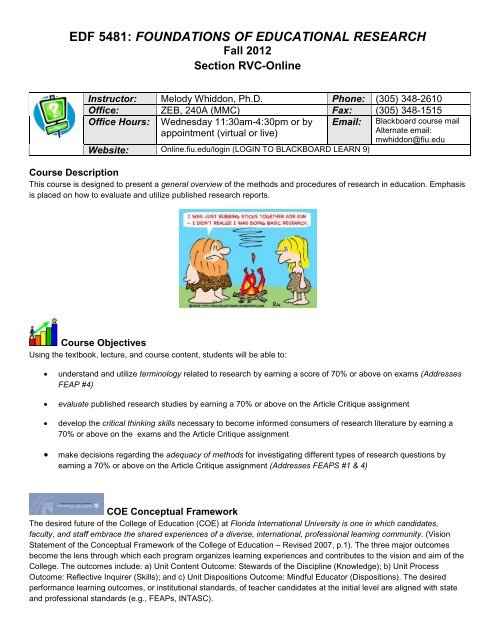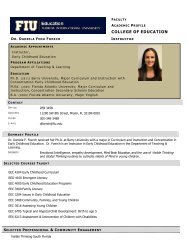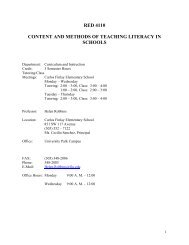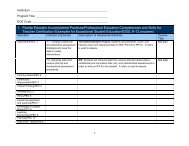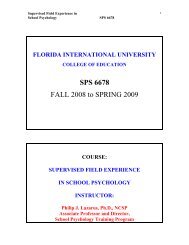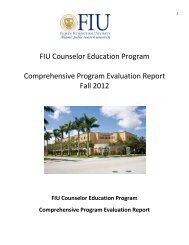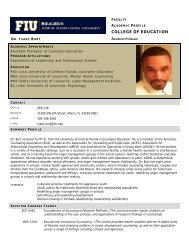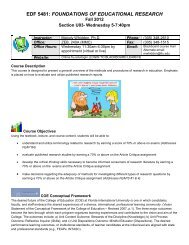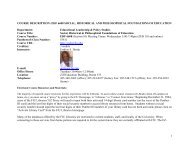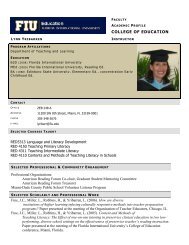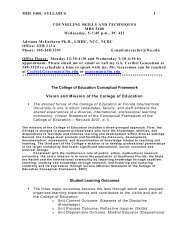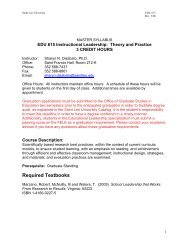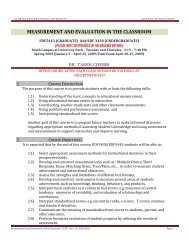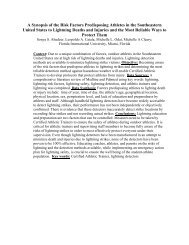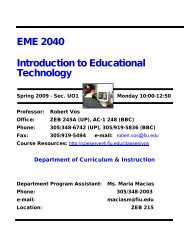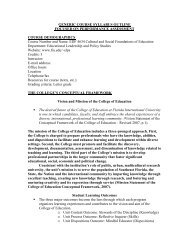edf 5481: foundations of educational research - College of Education
edf 5481: foundations of educational research - College of Education
edf 5481: foundations of educational research - College of Education
You also want an ePaper? Increase the reach of your titles
YUMPU automatically turns print PDFs into web optimized ePapers that Google loves.
EDF <strong>5481</strong>: FOUNDATIONS OF EDUCATIONAL RESEARCH<br />
Fall 2012<br />
Section RVC-Online<br />
Instructor: Melody Whiddon, Ph.D. Phone: (305) 348-2610<br />
Office: ZEB, 240A (MMC) Fax: (305) 348-1515<br />
Office Hours: Wednesday 11:30am-4:30pm or by<br />
appointment (virtual or live)<br />
Email:<br />
Website: Online.fiu.edu/login (LOGIN TO BLACKBOARD LEARN 9)<br />
Blackboard course mail<br />
Alternate email:<br />
mwhiddon@fiu.edu<br />
Course Description<br />
This course is designed to present a general overview <strong>of</strong> the methods and procedures <strong>of</strong> <strong>research</strong> in education. Emphasis<br />
is placed on how to evaluate and utilize published <strong>research</strong> reports.<br />
Course Objectives<br />
Using the textbook, lecture, and course content, students will be able to:<br />
• understand and utilize terminology related to <strong>research</strong> by earning a score <strong>of</strong> 70% or above on exams (Addresses<br />
FEAP #4)<br />
• evaluate published <strong>research</strong> studies by earning a 70% or above on the Article Critique assignment<br />
• develop the critical thinking skills necessary to become informed consumers <strong>of</strong> <strong>research</strong> literature by earning a<br />
70% or above on the exams and the Article Critique assignment<br />
• make decisions regarding the adequacy <strong>of</strong> methods for investigating different types <strong>of</strong> <strong>research</strong> questions by<br />
earning a 70% or above on the Article Critique assignment (Addresses FEAPS #1 & 4)<br />
COE Conceptual Framework<br />
The desired future <strong>of</strong> the <strong>College</strong> <strong>of</strong> <strong>Education</strong> (COE) at Florida International University is one in which candidates,<br />
faculty, and staff embrace the shared experiences <strong>of</strong> a diverse, international, pr<strong>of</strong>essional learning community. (Vision<br />
Statement <strong>of</strong> the Conceptual Framework <strong>of</strong> the <strong>College</strong> <strong>of</strong> <strong>Education</strong> – Revised 2007, p.1). The three major outcomes<br />
become the lens through which each program organizes learning experiences and contributes to the vision and aim <strong>of</strong> the<br />
<strong>College</strong>. The outcomes include: a) Unit Content Outcome: Stewards <strong>of</strong> the Discipline (Knowledge); b) Unit Process<br />
Outcome: Reflective Inquirer (Skills); and c) Unit Dispositions Outcome: Mindful Educator (Dispositions). The desired<br />
performance learning outcomes, or institutional standards, <strong>of</strong> teacher candidates at the initial level are aligned with state<br />
and pr<strong>of</strong>essional standards (e.g., FEAPs, INTASC).
Florida <strong>Education</strong> Accomplished Practices (FEAPS)<br />
EDF <strong>5481</strong> content works toward the accomplishment <strong>of</strong> the following FEAPS:<br />
• FEAP #1 – Assessment<br />
o<br />
The pr<strong>of</strong>essional teacher/counselor continually reviews and assesses data gathered from a variety <strong>of</strong> sources. These<br />
sources can include, but shall not be limited to, pretests, standardized tests, portfolios, anecdotal records, case<br />
studies, subject-area inventories, cumulative records, and student services information. The pr<strong>of</strong>essional teacher<br />
develops instructional plans that meet students' cognitive, social, linguistic, cultural, emotional, and physical needs.<br />
• FEAP #4 – Critical thinking<br />
o<br />
The pr<strong>of</strong>essional teacher/counselor uses a variety <strong>of</strong> performance assessment techniques and strategies that<br />
measure higher-order thinking skills in students and provides realistic projects and problem-solving activities which<br />
will enable all students to demonstrate their ability to think creatively.<br />
CACREP Clinical Mental Health Counseling<br />
• I1—Understands how to critically evaluate <strong>research</strong> relevant to the practice <strong>of</strong> clinical mental health counseling.<br />
• I2—Knows models <strong>of</strong> program evaluation for clinical mental health programs.<br />
Textbook<br />
<strong>Education</strong>al Research: Quantitative, Qualitative, and<br />
Mixed Approaches (4 th edition)<br />
Burke Johnson & Larry Christensen<br />
Sage (2012)<br />
ISBN: 978-1-4129-7828-6<br />
Course Requirements<br />
COURSE REQUIREMENT<br />
WEIGHT<br />
Syllabus Quiz (3 points): You will complete the syllabus quiz during week 2 (Do not confuse with<br />
the practice quiz).<br />
3%<br />
Adobe Connect Sessions (5 points each): There will be 3 online virtual meetings. You are<br />
required to attend these sessions. If you cannot attend, you have the option <strong>of</strong> listening to the<br />
recorded sessions and completing a one-page summary. (Addresses FEAPS 1, 2 & 4; CACREP<br />
Standards I1 & I2)<br />
15%<br />
Video Discussions (5 points each): There will be 5 video discussions throughout the semester.<br />
You are required to watch 2 videos and participate in the discussion (note: discussion= more than<br />
one post—see grading rubric below) (Addresses FEAPS 1, 2 & 4; CACREP Standards I1 & I2)<br />
10%
StudyMate Activities (1 point each): You will play a game/activity in StudyMate for each chapter<br />
(Addresses FEAPS 1)<br />
20%<br />
Topic Activities (1 point each): You will complete 7 participation activities throughout the<br />
semester (Addresses FEAPS 1)<br />
7%<br />
Online exams (15 points each): Three exams will be given but the lowest grade will be<br />
dropped. No make-up exams will be given (Addresses FEAPS 1 & 4)<br />
30%<br />
TaskStream assignment (15 points); A passing grade must be earned in order to pass the<br />
course (Addresses FEAPS 1, 2 & 4; CACREP Standards I1 & I2)<br />
15%<br />
Total 100%<br />
*** You can calculate your current grade at any point by adding up the total points you earned and divide it by the total<br />
points assigned up to that point.<br />
Grade Scale<br />
Letter<br />
Grade<br />
Range<br />
Letter<br />
Grade<br />
Range<br />
Letter<br />
Grade<br />
Range<br />
A Above 92 B- 80-83 D+ 67 - 69<br />
A- 90 - 92 C+ 77 - 79 D 64 - 66<br />
B+ 87 - 89 C 74 - 76 D- 61 - 63<br />
B 84 - 86 C- 70 - 73 F < 61<br />
EXTRA CREDIT: Students may earn up to 3 three extra credit points on their final course<br />
grades by participating in <strong>research</strong> studies, if available. Some studies can be completed online, while<br />
others require that you come to campus to participate. One extra credit point will be assigned for each<br />
<strong>research</strong> point earned, up to 3 points. Some studies are worth 1 point but others may be worth 2 or<br />
more points. Note: When completing studies worth 1 point, you will have to participate in 3 studies to<br />
earn the maximum 3 extra credit points. If you participate in a study worth 3 credits, you only have to<br />
participate in one study to achieve the 3 points extra credit. See http://fiu.sona-systems.com/ for<br />
<strong>research</strong> participation opportunities. (You may need to unblock messages in your spam filter from<br />
psyexp@fiu.edu to receive messages from this system). You do NOT need to notify me when you<br />
complete extra credit. I will receive the list <strong>of</strong> extra credit points at the end <strong>of</strong> the semester and post<br />
them at that time.
MAKEUP POLICY:<br />
Since the lowest exam grade will be dropped, no make-ups will be permitted.<br />
ASSIGNMENT DETAILS<br />
Syllabus/Website Quiz<br />
During the second week <strong>of</strong> the semester, you will take a quiz based on the course requirements. The purpose is<br />
to ensure that you clearly understand the course requirements.<br />
Abobe Connect Pro Virtual Meetings<br />
The Adobe Connect Pro Meeting is an online meeting room in which you can interact with your Pr<strong>of</strong>essor and<br />
fellow students by sharing your computer, screens or files, chat, broadcast live audio and take part in other<br />
interactive online activities. Your Adobe Connect Pro Meeting room will be located within your online course in the<br />
course content section.<br />
Three (see course calendar) virtual meetings will be held throughout the semester using Adobe Connect for<br />
explanation <strong>of</strong> material, group activities, and question and answer time. You are required to “attend” three<br />
sessions (5 points each) or complete an alternate assignment if you do not attend. The alternate assignment will<br />
require you to listen to the recorded session and write a one-page summary <strong>of</strong> the meeting. You will ask any<br />
questions you have in this paper as well. Submit the alternate assignment in the “Virtual Meeting Alternate<br />
Assignment Dropbox” in blackboard.<br />
Requirements for using Adobe Connect Pro Meeting:<br />
1. Disable any window pop-up blocker.<br />
2. Adobe Flash Player 9 or higher<br />
3. If you are sharing your screen or uploading content to the meeting room then you need to install the<br />
Adobe Acrobat Connect Add-in for Windows or Macintosh.<br />
4. You can test your computer to make sure that you are set up with all <strong>of</strong> the tools you will need to<br />
participate in the meeting.<br />
Please click here to help you get started with Adobe Connect Pro Meeting.<br />
Discussion Forums<br />
Five weeks (see syllabus calendar), there will be a video to watch within the course. You must choose two video<br />
discussions in which you will participate (5 points each). You will discuss the video with classmates. Posts should<br />
reference the videos and the reading material and should demonstrate that you read and understand the<br />
assigned textbook chapter. Grading Rubrics (see below) will be posted in the discussion forum. Your discussion<br />
grade will be posted within a week <strong>of</strong> the due date. Discussion posts are due on their designated week on Sunday<br />
at 11:59pm. LATE POSTS WILL NOT BE GRADED.<br />
Keep in mind that forum discussions are public, and care should be taken when determining what to post. If you<br />
need to send a private message to an instructor or student, please use email.<br />
StudyMate Activities<br />
You will participate in a StudyMate activity for each chapter, based on the weekly readings. You will earn 1 point<br />
for each StudyMate Activity for a total <strong>of</strong> 20 points. Activities are due on Sunday at 11:59pm <strong>of</strong> the week in which<br />
they are assigned, though you will be able to play the games throughout the entire semester to help you prepare
for exams. Note: You are only required to choose one type <strong>of</strong> game (i.e., crossword puzzle, flashcards, etc.) but<br />
you are welcome to utilize additional types <strong>of</strong> games for study purposes. You will not “submit” anything. The<br />
system tracks your participation (behind the scenes).Your two questions for the Games are due on Sunday at<br />
11:59pm<br />
Topic Activities<br />
You will participate in a Topic activity for seven <strong>of</strong> the chapters, based on the weekly readings and notes. You will<br />
earn 1 point for each Topic Activity for a total <strong>of</strong> 7 points. These activities will be graded based on participation,<br />
not content, though correct answers will be posted after the due date. You will submit each Topic Activity to the<br />
dropbox under the respective week by Sunday at 11:59pm <strong>of</strong> the week in which they are assigned.<br />
Exams<br />
Three online exams (15 points each) will be given; the lowest grade will be dropped. You will have 100 minutes to<br />
complete 60 multiple choice, matching, and true/false questions pertaining to the text book and course material.<br />
You are only allowed one attempt at each exam so do not enter the exams until you are ready to take them. You<br />
will see your grade after the due date and time which always falls on Sunday at 11:59pm. Because the lowest<br />
exam grade is dropped, if you take the first two exams and are satisfied with your grade, you may choose to skip<br />
exam 3.<br />
Important information regarding exams:<br />
• Exams have time limits; all questions must be answered and submitted before the time expires. When the<br />
time has run out, the exam is submitted automatically with whatever answers have been saved at that point.<br />
• Be aware <strong>of</strong> the availability window on exams.<br />
o<br />
For example: If your exam is available from 7am - 7pm and you have 1 hour to complete the exam;<br />
you would need to start your exam at 6pm in order for you to have the full hour. If you start at 6:20<br />
then you will only have 40 minutes to complete your exam. For this course, all exams are due at<br />
11:59 on Sunday.<br />
Article Critique Taskstream Paper<br />
For the TaskStream assignment, you must select an empirical article (look for “measures” and “methods”<br />
sections) and write a critique based on the specifications below. I encourage you to email me your article by<br />
September 9th to ensure its appropriateness for this assignment—if you do your critique on an article that is not<br />
an empirical study, you will receive a failing grade. You will also have submit your rough draft to instructor by<br />
attaching it to an email by October 28 th for specific feedback (using tracked changes and comments) prior to<br />
grading. The final paper is due in TaskStream by the final due date, November 18th at 11:59pm. The paper is<br />
worth 15 points--Please note: In order to receive credit, you must upload the assignment to Task Stream (see<br />
below for details)<br />
ARTICLE CRITIQUE REQUIREMENTS:<br />
The critique will be 7-9 double-spaced pages long, and should include the following:<br />
• The journal article is summarized section-by-section, then evaluated/critiqued<br />
• Alternatively, each section <strong>of</strong> the article may be summarized, then critiqued before going to the next<br />
section.<br />
Your critique must meet ALL <strong>of</strong> the following criteria:<br />
• It reports the finding <strong>of</strong> an empirical study (not a review paper),
• It includes first hand data based on at least 50 individuals/units/observations (sample size)<br />
• It is published in a scholarly journal with a publication date no more than two years before the beginning<br />
<strong>of</strong> the current semester (i.e. not more than 2 years old)<br />
• The published length <strong>of</strong> the article is at least 11 pages, not including references and appendices<br />
Follow the outline below as you write your critique paper.<br />
• Summarize the Introduction and Literature Review Sections <strong>of</strong> the article<br />
o Critique/Evaluate the Research Problem:<br />
• What is the major <strong>research</strong> problem identified in the study Is the problem clearly stated<br />
• What is the author(s) justification for conducting the study<br />
• What is/are the purpose(s) <strong>of</strong> the study<br />
• Is the selection <strong>of</strong> a quantitative approach instead <strong>of</strong> a qualitative approach justified<br />
• Is there a theoretical basis for the study If yes, briefly describe the theory.<br />
• What is (are) the <strong>research</strong> question(s), objective(s) or hypotheses<br />
• What is the relationship between the theory and the <strong>research</strong> questions, objectives or<br />
hypotheses<br />
• Summarize the Methods Sections <strong>of</strong> the article (which includes the participants, measures, procedures, etc.)<br />
o Critique/Evaluate the Measurement issues:<br />
• What are the primary concepts/variables in the study<br />
• Are there independent and dependent variables If yes, what are they<br />
• For each <strong>of</strong> these variables, state the conceptual or operational definition. Comment on the<br />
adequacy <strong>of</strong> the definition(s).<br />
• Is there evidence that the measures used were valid<br />
• Is there evidence that the measures used were reliable<br />
o Critique/Evaluate the Research Design issues:<br />
o Critique/Evaluate the following areas:<br />
• What specific <strong>research</strong> design(s) did the authors use (May not be stated directly you should<br />
be able to figure it out based on what you have learned)<br />
• Are there threats to internal and external validity If yes, discuss.<br />
o Critique/Evaluate the Sampling issues:<br />
• What is the population that the authors wanted to study (i.e., target population)<br />
• Does the population (i.e., sampling frame) from which the sample was taken represent all <strong>of</strong><br />
the appropriate people<br />
• What type <strong>of</strong> sampling technique was used<br />
• What are the implications <strong>of</strong> this sampling technique for the findings<br />
• Are there issues with external validity<br />
o Critique/Evaluate the Data Collection issues:<br />
• What data collection method(s) did the <strong>research</strong>er(s) use<br />
• What are the advantages and disadvantaged <strong>of</strong> the data collection method(s) used<br />
• Summarize the Results section <strong>of</strong> the article<br />
o Critique/Evaluate the Data Analysis issues:<br />
• How were the data analyzed<br />
• What type(s) <strong>of</strong> analysis and statistics used in the study<br />
o Critique/Evaluate the Results issues:<br />
• What are the major results/findings <strong>of</strong> the study<br />
• How do these results answer the original <strong>research</strong> question(s)<br />
• How confident are you with the findings<br />
• Summarize the Discussion/Conclusion <strong>of</strong> the article<br />
o Critique/Evaluate the Implications <strong>of</strong> the Findings:<br />
• What conclusions did the authors reach<br />
• Are these conclusion(s) appropriate<br />
• What did the <strong>research</strong>ers report as the implications <strong>of</strong> the study<br />
• In your opinion, what is the significance <strong>of</strong> the findings for your area <strong>of</strong> interest
• Your Contribution: This section is very important. It should be at least two pages.<br />
o If you were to conduct this study again:<br />
o What would change, and why<br />
o What would keep, and why<br />
o What would you delete, and why<br />
SUBMITTING THE ASSIGNMENT<br />
• To receive credit for the TaskStream assignment, you must post it on TaskStream, the COE’s new web-based<br />
electronic portfolio application. All students enrolled in the <strong>College</strong> <strong>of</strong> <strong>Education</strong> are required to purchase and<br />
maintain a TaskStream account throughout their FIU career so they can generate and maintain an electronic<br />
portfolio <strong>of</strong> their work in the college. You can purchase a TaskStream account online. You have the option <strong>of</strong><br />
selecting the terms <strong>of</strong> your subscription. However, you must maintain your Taskstream account throughout<br />
your pr<strong>of</strong>essional preparation program. Costs and other Taskstream information can be found at this COE<br />
website: http://education.fiu.edu/taskstream/ and by visiting or calling the COE computer lab in ZEB 165 (305-<br />
348-6134).<br />
o<br />
Once you have a TaskStream account, you will need to self-enroll in an assessment program that<br />
houses this course. The program code to self-enroll for this course will probably be EDF<strong>5481</strong>-<br />
RVCFA12 (see Program Code List Fall 2012 at http://education.fiu.edu/TaskStream ).<br />
• For help, contact:<br />
• 800-311-5656<br />
• help@taskstream.com<br />
• COE Taskstream Website: http://education.fiu.edu/taskstream/<br />
• COE Computer Lab, ZEB 165: 305-348-6134<br />
• COE IT Department, ZEB 269: 305-348-6305 coesupport@fiu.edu<br />
ASSIGNMENT GRADING:<br />
• PANEL REVIEW<br />
• The artifacts you upload onto Taskstream may be reviewed by a Panel <strong>of</strong> Assessment Raters<br />
in the <strong>College</strong> to ensure fairness and consistency in the scoring <strong>of</strong> the critical assignments.<br />
These reviews are required for accreditation purposes. The students’ assignments reviewed<br />
will have no identifying information so the raters will not know whose students’ work they are<br />
reviewing. All data aggregated will contain no personal identifying information to ensure<br />
confidentiality <strong>of</strong> students’ work.<br />
• SCORING RUBERIC<br />
• Level 3: Student has constructed a completely accurate, comprehensive and feasible<br />
summary, and evaluated each section <strong>of</strong> the article in a critical and informed manner. The<br />
student demonstrated an exceptional understanding, interpretation, and evaluation <strong>of</strong> the<br />
results obtained and reported in <strong>educational</strong> <strong>research</strong> article reviewed. The student<br />
conclusions based on the <strong>research</strong> and assessment data provided was exemplary and<br />
reflects advanced critical thinking skills.<br />
• Level 2: Student has constructed an adequate summary <strong>of</strong> all components <strong>of</strong> the paper, has<br />
evaluated each section, and demonstrates satisfactory understanding <strong>of</strong> the results reported<br />
in the article reviewed. Evaluation covers most problematic issues in each section <strong>of</strong> the<br />
article. Adequate critical thinking skills are demonstrated.<br />
• Level 1: Student did not summarize each section <strong>of</strong> the article adequately, or fails to critically<br />
evaluate each section adequately. There is a limited or lack <strong>of</strong> understanding demonstrated<br />
in the report <strong>of</strong> the results and the critical evaluation is incomplete. The report lacks a critical<br />
analysis by the student.<br />
IMPORTANT SCORING INFORMATION<br />
• In addition to the afore-mentioned scoring, you will be assigned a numeric grade up to 15 points (15=<br />
perfect score).
o<br />
While you will receive your taskstream score <strong>of</strong> 1-3 fairly quickly (generally within a week <strong>of</strong><br />
submitting), you may not see your numeric grade in Blackboard until several weeks later.<br />
• If you receive a score <strong>of</strong> 3 in taskstream, you can assume you will earn a numeric<br />
score <strong>of</strong> 13 to 15 points<br />
• If you receive a score <strong>of</strong> 2 in taskstream, you can expect to earn a numeric score<br />
ranging from 10-13, depending on the quality <strong>of</strong> the paper.<br />
• If you receive a score <strong>of</strong> 1 in taskstream, that is failing and you will be asked to resubmit<br />
the paper in order to pass the course.<br />
Course Calendar<br />
WEEK DATE MODULE TOPIC READ DUE<br />
1<br />
2<br />
3<br />
Aug 20-<br />
26<br />
Aug 27-<br />
Sept 2<br />
Sept 3-9<br />
-Introduction to <strong>Education</strong>al Research Chapter 1<br />
-Quantitative, Qualitative and Mixed Research;<br />
-How to Review the Literature and Develop<br />
Research Questions<br />
-How to Write a Research Proposal;<br />
Chapter 2,<br />
Chapter 3,<br />
4<br />
-Introduction on disc board<br />
-Syllabus Quiz<br />
-Ch 1 Game<br />
-EMAIL mwhiddon@fiu.edu if<br />
you did not receive<br />
-Ch 2 Game<br />
-Video Discussion 1: Research<br />
Methods<br />
-Ch 3 Game<br />
-Activity #1 (ch 3)<br />
-Article due for approval via<br />
email<br />
-Ch 4 Game<br />
4<br />
Sept 10-<br />
16<br />
-Research Ethics<br />
-Standardized Measurement and Assessment;<br />
Chapter 5,<br />
6<br />
- VIRTUAL MEETING: Monday<br />
9/10/12, 9-10pm<br />
-Ch 5 Game<br />
-Ch 6 Game<br />
5<br />
Sept 17-<br />
23<br />
-How to Construct a Questionnaire Chapter 7<br />
-Ch 7 Game<br />
-Activity #2 (ch 7)<br />
6<br />
Sept 24-<br />
30<br />
Exam 1 (Ch 1-7)<br />
7<br />
8<br />
9<br />
10<br />
Oct 1-7<br />
Oct 8-14<br />
Oct 15-<br />
21<br />
Oct 22-<br />
28<br />
-Methods <strong>of</strong> Data Collection;<br />
-Sampling in Quantitative, Qualitative, and Mixed<br />
Research<br />
-Methods <strong>of</strong> Data Collection;<br />
-Sampling in Quantitative, Qualitative, and Mixed<br />
Research<br />
-Validity <strong>of</strong> Research Results in Quantitative,<br />
Qualitative, and Mixed Research;<br />
-Experimental Research<br />
-Quasi-Experimental and Single Case Designs;<br />
-Nonexperimental Quantitive Research<br />
Chapter 8,<br />
9<br />
Chapter<br />
10, 11<br />
Chapter<br />
12, 13<br />
Chapter<br />
14<br />
-Ch 8 Game<br />
-Ch 9 Game<br />
-Activity #3 (ch 9)<br />
-Video Discussion 2:<br />
Quantitative Methods<br />
- VIRTUAL MEETING:<br />
Wednesday 2/22/11 at 3:00pm:<br />
-Ch 10 Game<br />
-Ch 11 Game<br />
-Activity #4 (ch 11)<br />
-Ch 12 Game<br />
-Ch 13 Game<br />
-Video Discussion 3: Research<br />
Designs<br />
-Thursday 3/8/12 at 9pm:<br />
9:00pm:VIRTUAL MEETING<br />
-Ch 14 Game<br />
-Video Discussion 4: Qualitative<br />
Methods
11<br />
Oct 29-<br />
Nov 4<br />
Exam 2 (Ch 8-14)<br />
-Article Critique Rough Draft<br />
due as email attachment<br />
12<br />
13<br />
Nov 5-<br />
11<br />
Nov 12-<br />
18<br />
-Historical Research;<br />
-Mixed Research;<br />
- Descriptive Statistics;<br />
-Inferential Statistics<br />
Chapter<br />
15, 16<br />
Chapter<br />
17, 18<br />
-Ch 15 Game<br />
-Ch 16 Game<br />
-Video Discussion 5: Research<br />
Skills for Students<br />
-(You will receive your Article Critique<br />
Rough Draft Feedback by 11/11)<br />
-Ch 17 Game<br />
-Ch 18 Game<br />
-Activity #5 (ch 18)<br />
-Article Critique Paper Due on<br />
Taskstream by 11/18<br />
14<br />
15<br />
16<br />
Nov 19-<br />
25<br />
Nov 26-<br />
Dec 2<br />
Dec 3-5<br />
Study Week: No Assignments Due<br />
Happy Holiday!<br />
-Data Analysis in Qualitative and Mixed Research;<br />
-How to Prepare a Research Report and Use APA<br />
Style Guidelines<br />
Chapter<br />
19, 20<br />
Exam 3 (Ch 15-20)—DUE WEDNESDAY<br />
-Ch 19 Game<br />
-Activity #6 (ch 19)<br />
-Ch 20 Game<br />
-Activity #7 (ch 20)<br />
ALL ASSIGNMENTS AND EXAMS MUST BE SUBMITTED BY 11:59PM ON THEIR SUNDAY DUE DATE TO<br />
RECEIVE CREDIT EXCEPT EXAM 3<br />
Academic Integrity Statement<br />
Florida International University is a community dedicated to generating and imparting knowledge through excellent<br />
teaching and <strong>research</strong>, the rigorous and respectful exchange <strong>of</strong> ideas, and community service. All students should respect<br />
the right <strong>of</strong> others to have an equitable opportunity to learn and honestly to demonstrate the quality <strong>of</strong> their learning.<br />
Therefore, all students are expected to adhere to a standard <strong>of</strong> academic conduct that demonstrates respect for<br />
themselves, their fellow students, and the <strong>educational</strong> mission <strong>of</strong> Florida International University. All students are deemed<br />
by the University to understand that if they are found responsible for academic misconduct, they will be subject to the<br />
Academic Misconduct procedures and sanctions, as outlined in the Student Handbook. Students who plagiarize or cheat<br />
can be charged with academic misconduct. Penalties for academic misconduct can be as severe as dismissal from the<br />
University.<br />
Be assured and forewarned that cheating will not be tolerated in this course. All cases <strong>of</strong> suspected cheating or plagiarism<br />
will be referred to the University's Committee on Academic Misconduct. This action is required by all instructors.<br />
Regarding the consequences <strong>of</strong> being found guilty <strong>of</strong> dishonest academic practice, the instructor shall make an academic<br />
judgment about the student's grade on that work and in that course and shall report such incidents to the Primary<br />
Administrative Officer.<br />
Misconduct includes:<br />
Cheating: The unauthorized use <strong>of</strong> books, notes, aids, electronic sources; or assistance from another person with respect<br />
to examinations, course assignments, field service reports, class recitations; or the unauthorized possession <strong>of</strong><br />
examination papers or course materials, whether originally authorized or not.<br />
Plagiarism: The use and appropriation <strong>of</strong> another's work without any indication <strong>of</strong> the source and the representation <strong>of</strong><br />
such work as the student's own. Any student, who fails to give credit for ideas, expressions, or materials taken from<br />
another source, including internet sources, is guilty <strong>of</strong> plagiarism--- (http://www.fiu.edu/~sccr/standards_<strong>of</strong>_conduct.htm)
Disability Resource Center<br />
Disability Resource Center Website: http://drc.fiu.edu/<br />
The Disability Resource Center’s mission is to provide FIU students with disabilities the necessary supports to<br />
successfully complete their education and participate in activities available to all students. If you have a diagnosed<br />
disability and need assistance or instructional accommodations, please contact the Center at 305-348-3532 or visit them<br />
at the Graham Center (GC) 190.<br />
EPS Pr<strong>of</strong>essional Code <strong>of</strong> Decorum<br />
The following expectations constitute the Code <strong>of</strong> Pr<strong>of</strong>essional Decorum governing conduct in the Department <strong>of</strong><br />
<strong>Education</strong>al & Psychological Studies (EPS). These expectations are essential to the department's goal <strong>of</strong> providing<br />
students with a quality education in an environment conducive to learning. A committee <strong>of</strong> EPS students and faculty<br />
developed this Code. Students and faculty in the department <strong>of</strong> EPS shall: a) be respectful <strong>of</strong> the learning environment; b)<br />
be respectful <strong>of</strong> all individuals in class; c) have a pr<strong>of</strong>essional commitment to learning; and d) have pr<strong>of</strong>essional integrity.<br />
1. Shall be Respectful <strong>of</strong> the Learning Environment<br />
• Be punctual: Arrive to class and return from breaks on-time<br />
• Keep beepers and cellular phones <strong>of</strong>f or on silent mode during class<br />
• Avoid disruptive conduct (i.e., any behavior that interferes with class functions)<br />
2. Shall Be Respectful <strong>of</strong> All Individuals in Class<br />
• Appropriately participate in classroom discussions and activities<br />
• Allow equal opportunity for all class members to participate<br />
• Have respect for the opinions <strong>of</strong> others by voicing disagreements in a pr<strong>of</strong>essional manner<br />
3. Shall Have a Pr<strong>of</strong>essional Commitment to Learning<br />
• Complete and turn in assignments on time<br />
• Make personal efforts to get assistance from fellow classmates/faculty to facilitate learning<br />
• Strive for perfect class attendance<br />
4. Shall Have Pr<strong>of</strong>essional Integrity<br />
• Engage in academic honesty<br />
• If absent from class, take personal responsibility for missed content<br />
• Pr<strong>of</strong>essionally represent yourself and the university at all intern sites


